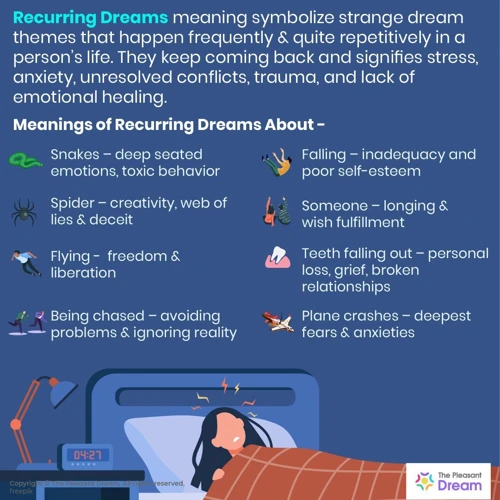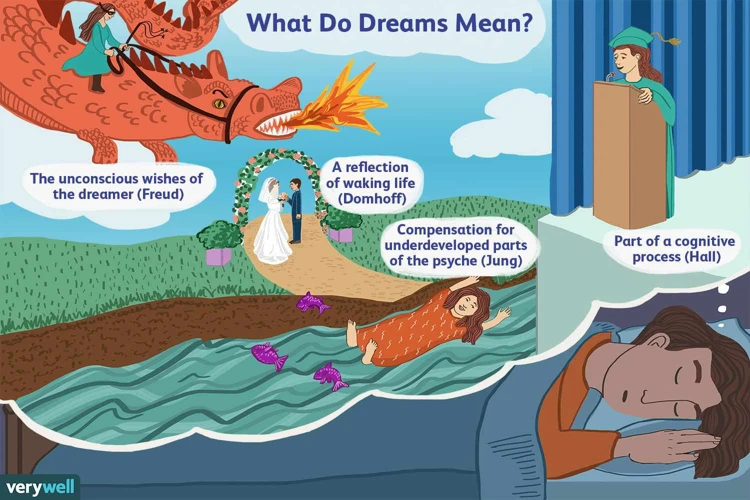Have you ever woken up from a vivid dream, only to find that it keeps haunting you night after night? These recurring dreams can be both perplexing and fascinating, leaving us with lingering questions and a deeper desire to understand their psychological significance. In this article, we will delve into the world of recurring dreams and explore their definitions, theories, common themes, and interpretations. We will also examine the role of emotions in recurring dreams, their impact on personal growth, and effective ways to put an end to these persistent nocturnal experiences. So, buckle up and get ready to explore the mysterious realm of recurring dreams!
The Definition of Recurring Dreams

Recurring dreams are a fascinating and often puzzling phenomenon that occur when an individual experiences the same or similar dreams repeatedly. These dreams stand out from typical dreams due to their repetitive nature, occurring over a period of time rather than being a one-time occurrence. They can persist for weeks, months, or even years. Recurring dreams often feature similar themes, scenarios, or characters, which may vary slightly between each occurrence. This repetition serves to capture the dreamer’s attention and curiosity, as they try to decipher the deeper meaning behind these recurrent experiences. Recurring dreams can be vivid and emotionally charged, creating a lasting impact on the dreamer. The frequency and intensity of these dreams can vary from person to person, with some individuals experiencing them sporadically and others having recurring dreams on a regular basis. It is important to note that these dreams are subjective experiences and can have different meanings for each individual. For further understanding of recurring dreams and their significance, continue reading about the unresolved issues theory, tips for unlocking the meaning of recurring dreams, and analyzing recurring dreams for subconscious desires.
Theories and Interpretations

When it comes to understanding and interpreting recurring dreams, several theories and interpretations have emerged in the field of psychology. These theories aim to shed light on the underlying psychological significance of these persistent nocturnal experiences. The unresolved issues theory suggests that recurring dreams serve as a reflection of unresolved conflicts or issues in the dreamer’s waking life, highlighting the need for resolution or closure. The emotional processing theory posits that recurring dreams provide a platform for the dreamer to process and regulate their emotions, particularly those that may be too overwhelming or difficult to confront in their waking life. The deep-rooted symbolism theory, on the other hand, suggests that recurring dreams are laden with symbolic representations that reflect the dreamer’s unconscious desires, fears, or aspirations. By exploring these theories and interpretations, we can gain a deeper understanding of the psychological significance behind recurring dreams.
The Unresolved Issues Theory
The unresolved issues theory is one of the many interpretations behind the psychological significance of recurring dreams. According to this theory, recurring dreams are a manifestation of unresolved emotions, conflicts, or unresolved issues in the dreamer’s waking life. These dreams serve as a subconscious way for the mind to bring attention to these unresolved matters that may have been pushed aside or ignored. The repetitive nature of the dreams signifies the persistent presence of these unresolved issues and suggests that they are in need of resolution or acknowledgement. These unresolved issues can vary widely, ranging from past traumas and unaddressed emotions to unresolved conflicts or unfulfilled ambitions. The themes and symbols present in recurring dreams often reflect the nature of these unresolved issues. It is through the exploration and understanding of these unresolved issues that the dreamer can begin to find healing and resolution. The unresolved issues theory provides a valuable perspective in decoding the psychological significance of recurring dreams, reminding us of the importance of addressing our emotions and conflicts in order to find peace and progress in our waking lives.
The Emotional Processing Theory
The Emotional Processing Theory suggests that recurring dreams serve as a mechanism for processing and dealing with unresolved emotions and experiences in our waking lives. These dreams act as a therapeutic tool, allowing individuals to revisit and work through emotional issues that may have been repressed or ignored. By reliving these emotions in the dream state, the dreamer is given the opportunity to process and release them. This theory posits that recurring dreams often revolve around intense or traumatic experiences, such as past relationships, losses, or conflicts, and can be triggered by similar situations in our present lives. These dreams allow us to confront and confront and express our emotions in a safe and controlled environment, providing a platform for catharsis and emotional healing. Through recurring dreams, our minds may be trying to communicate to us that there are unresolved feelings or experiences that need our attention. By recognizing and addressing these emotions in our waking lives, we can potentially find resolution and closure. The table below summarizes the key points of the Emotional Processing Theory:
| Emotional Processing Theory |
|---|
| – Recurring dreams facilitate the processing of unresolved emotions |
| – Dreams provide a safe and controlled environment for emotional exploration |
| – Intense or traumatic experiences are often the focus of recurring dreams |
| – Dreams may be triggered by similar situations in our waking lives |
| – Addressing these emotions in waking life can lead to resolution and closure |
The Deep-rooted Symbolism Theory
The deep-rooted symbolism theory suggests that recurring dreams are a manifestation of deep-seated symbols and archetypes that reside within the dreamer’s subconscious mind. These symbols can represent universal themes and emotions that are shared by humanity across cultures and time. According to this theory, recurring dreams tap into the collective unconscious, a concept introduced by renowned psychologist Carl Jung. The collective unconscious is a reservoir of shared knowledge and experiences that are inherited and present in all individuals.
Each recurring dream is thought to contain symbolic imagery that holds personal significance to the dreamer. These symbols may be rooted in past experiences, desires, fears, or unresolved issues. The repetition of these symbols serves as a way for the subconscious mind to communicate and process complex emotions or conflicts that may be difficult to articulate in waking life.
Analyzing the symbolism within recurring dreams can offer valuable insights into the dreamer’s psyche. Common symbols in recurring dreams include water, animals, bridges, houses, and mirrors. For example, water may symbolize emotions, representing the depths of the unconscious mind or the ebb and flow of emotional states. Animals can represent instinctual desires or fears, while bridges may symbolize transitions or pathways in life. The interpretation of these symbols can vary depending on the individual’s personal experiences and cultural background.
Understanding and deciphering the deep-rooted symbolism in recurring dreams can provide a deeper understanding of oneself and promote personal growth. Identifying recurring symbols and reflecting on their significance can help uncover hidden desires, unresolved conflicts, or subconscious desires that may be influencing one’s waking life. By acknowledging and addressing these symbolic messages, individuals have the opportunity to gain self-awareness, heal emotional wounds, and make positive changes in their lives.
Common Themes in Recurring Dreams

Recurring dreams often feature common themes that transcend cultural boundaries, leaving dreamers perplexed and seeking answers. One prevalent theme is the sensation of falling or flying, where individuals experience a sense of weightlessness or a sudden drop, evoking both fear and exhilaration. Another common theme is being chased or pursued, where dreamers find themselves being pursued by an unknown entity or a familiar face, instilling a sense of fear and urgency. Missing or failing exams is yet another recurring theme that reflects feelings of unpreparedness or fear of judgment. Lastly, being naked in public is a recurring dream that often symbolizes vulnerability and the fear of being exposed or judged. These themes can provide valuable insights into the dreamer’s subconscious fears, aspirations, and unresolved emotions, guiding them towards a better understanding of their own psyche.
Falling or Flying
Falling or flying is one of the most common themes in recurring dreams. These dreams often evoke intense emotions and sensations of weightlessness or loss of control. In dreams of falling, individuals may experience the sensation of plummeting from great heights, such as a tall building or a cliff. This can lead to feelings of fear, anxiety, and vulnerability. The dreamer may wake up with a racing heart and a sense of relief that it was just a dream. On the other hand, dreaming of flying can be a liberating and empowering experience. The dreamer may soar through the sky, effortlessly navigating their surroundings and feeling a sense of freedom. This dream often represents a desire for liberation from real-life constraints, a longing for independence, or a need to overcome obstacles. Both falling and flying dreams can reflect a sense of insecurity or a desire for control in waking life. They may also symbolize the ups and downs of life, the fear of failure, or the exhilaration of success. It is important to consider the specific circumstances and emotions present in the dream, as well as the individual’s personal experiences and feelings, to gain a deeper understanding of the meaning behind these recurring dreams.
Being Chased or Pursued
Being chased or pursued is a common theme in recurring dreams that can evoke intense emotions and a sense of vulnerability. In these dreams, the dreamer often finds themselves being pursued by an unknown figure or a threatening entity. The pursuer may take different forms, such as a person, an animal, or even a supernatural being. The dreamer’s response to being chased can vary, with some feeling paralyzed by fear while others may attempt to escape and outrun their pursuer. This recurring theme may reflect feelings of anxiety, stress, or the need to confront unresolved issues in the dreamer’s waking life. It can symbolize a sense of being overwhelmed or pursued by responsibilities, expectations, or past traumas. The pursuit itself may represent a specific problem or challenge that the dreamer is trying to avoid or escape from. Alternatively, it can also indicate a deep longing for freedom, independence, or a desire to break free from constraints. Exploring the underlying emotions and circumstances surrounding being chased or pursued in recurring dreams can provide valuable insights into the dreamer’s subconscious fears, motivations, and unresolved conflicts.
Missing or Failing Exams
Missing or failing exams is a common theme in recurring dreams that many individuals experience. These dreams often evoke feelings of stress, anxiety, and a sense of being unprepared. In these dreams, the dreamer typically finds themselves either unable to find the exam location, arriving late, or completely forgetting to study for the exam. The fear of failure and the pressure to succeed in academic settings are often reflected in these recurring dreams. They may symbolize the fear of not meeting expectations or the anxiety of being judged based on performance. These dreams can be particularly unsettling for students or individuals who have had past negative experiences with exams. The recurring nature of these dreams suggests that there may be unresolved feelings or concerns surrounding academic performance or fear of judgment. Interpreting these dreams may involve examining the dreamer’s relationship with success, failure, and self-esteem. It could signify a need for better time management, improved study habits, or the desire for recognition and validation. Exploring these underlying emotions and seeking ways to manage exam-related stress can help alleviate the recurrence of these dreams.
Being Naked in Public
Being naked in public is a common theme that appears in many recurring dreams. This dream scenario can evoke strong feelings of vulnerability, embarrassment, and anxiety. It is a symbolic representation of a fear of being exposed or judged by others. When experiencing this dream, individuals often find themselves in a public setting, such as a school, workplace, or crowded street, completely devoid of clothing. The dreamer may try to hide or cover themselves, but their efforts are usually futile as they are constantly aware of their nakedness. This recurring dream can stem from deep-rooted insecurities, fear of rejection, or concerns about one’s self-image and how others perceive them. It reflects a fear of being seen for who they truly are and a desire to hide certain aspects of themselves. The intensity and frequency of this dream theme can vary from person to person. Some individuals may experience it infrequently, while others may have recurring dreams of being naked in public on a regular basis. It is important to explore the specific details and emotions associated with this dream to gain a deeper understanding of its personal significance.
Interpreting Specific Recurring Dreams

Interpreting specific recurring dreams can offer valuable insights into our subconscious minds and provide clues to unresolved issues or emotions that are deeply ingrained within us. One common recurring dream is the sensation of teeth falling out. While it may seem unsettling, this dream often symbolizes feelings of insecurity, vulnerability, or a fear of losing control. Another recurring dream involves being trapped, either physically or emotionally. This dream may signify a sense of entrapment in one’s waking life, whether in a relationship, job, or personal circumstance. Losing someone in a recurring dream can reflect underlying fears of abandonment or the struggle to cope with the loss of a loved one. Additionally, the recurring dream of exam anxiety taps into the stress and pressure we may feel in our waking lives, whether related to work, school, or personal expectations. Each of these specific recurring dreams holds a unique psychological significance, offering us a glimpse into our subconscious desires, fears, and unresolved conflicts.
Recurring Dream: Teeth Falling Out
One of the most common recurring dreams that individuals experience is the unsettling sensation of their teeth falling out. This dream scenario can evoke a strong emotional response and leave the dreamer feeling perplexed upon waking. While it may seem alarming, the dream of teeth falling out is often symbolic and represents underlying psychological or emotional issues. There are various interpretations associated with this recurring dream. Some theories suggest that it could indicate a fear of losing control or power in one’s life, as teeth are integral to communication and self-expression. Others believe that this dream may reflect anxieties related to appearance, aging, or a fear of judgment by others. The act of teeth falling out in a dream may signify a need for personal growth or a desire for change. It is important to consider the specific details and emotions associated with this recurring dream to gain a deeper understanding of its personal significance. Exploring the underlying emotions and examining any unresolved issues or concerns in one’s waking life can help shed light on the meaning of this recurring dream and help promote self-reflection and personal growth.
Recurring Dream: Being Trapped
Being trapped in a recurring dream is a common theme that many individuals experience. In these dreams, you may find yourself confined in a small space, unable to escape or break free. The feeling of being trapped can elicit intense emotions such as fear, anxiety, and frustration. These dreams often reflect a sense of powerlessness or a feeling of being stuck in a particular situation in your waking life. They might symbolize the challenges or obstacles that you feel are holding you back from reaching your goals. The specific details of the dream, such as the location or the presence of other people, can provide additional insights into its interpretation. For example, if you are trapped in a room with other people, it could signify a sense of being trapped in social or interpersonal dynamics. These dreams could also indicate a need for change or a desire to break free from routine or monotonous aspects of your life. Exploring the emotions and circumstances surrounding the dream can help uncover deeper meanings and provide guidance on potential steps to take in order to alleviate feelings of entrapment.
Recurring Dream: Losing Someone
In the realm of recurring dreams, one common theme that often leaves individuals feeling unsettled and emotionally shaken is the dream of losing someone. This recurring dream involves the distressing experience of losing a loved one or someone significant in the dreamer’s life. The dream may involve the sudden disappearance, death, or separation of the person, leaving the dreamer with a profound sense of grief, sadness, and longing. The intensity of emotions experienced in these dreams can be overwhelming, as the dreamer grapples with the fear of abandonment or the pain of separation. It is important to note that the person being lost in the dream may symbolize something deeper, such as the loss of a specific relationship, the fear of losing someone in waking life, or even the fear of losing a part of oneself. These dreams may also arise during times of transition or change, reflecting the dreamer’s anxieties and concerns about losing stability or familiarity in their waking life. To gain a better understanding of the underlying meaning of recurring dreams about losing someone, it is helpful to explore the emotions felt during the dream, reflect on any real-life circumstances that may be contributing to these dreams, and consider seeking the guidance of a therapist or dream analyst who can provide further insights and support.
Recurring Dream: Exam Anxiety
Recurring dreams centered around exam anxiety are a common occurrence among many individuals, particularly those who have experienced stress or pressure related to academic performance. These dreams often involve scenarios where the dreamer is unprepared for an exam, running late, or unable to find the exam location. The feelings of anxiety and fear associated with exams manifest themselves in these dreams, creating a heightened sense of urgency and pressure. One possible interpretation of this recurring dream is that it reflects the dreamer’s concerns about their abilities, readiness, or performance in real-life situations. It may be an indication of underlying insecurities or a fear of failure. This recurring dream may also be symbolic of the dreamer’s fear of being evaluated, judged, or scrutinized by others. Exam anxiety dreams can also signal a need for better preparation and time management skills in waking life. It is essential to acknowledge the emotional impact these dreams can have, as they can contribute to added stress and anxiety in waking life if not addressed. Understanding the recurring nature of these dreams and exploring their underlying causes can provide valuable insights into managing exam-related stress and improving overall well-being.
The Significance of Emotions in Recurring Dreams

Emotions play a significant role in recurring dreams, as they often serve as a powerful indicator of the dreamer’s innermost feelings, fears, and conflicts. Recurring dreams tend to evoke intense emotions that mirror the dreamer’s waking life experiences and unresolved emotional states. These emotions can range from fear, anxiety, and sadness to excitement, joy, and even anger. The intensity of these emotions can be magnified in recurring dreams due to their repetitive nature, leaving a lasting impact on the dreamer’s psyche. It is important to pay attention to the emotions experienced during these dreams, as they can provide valuable insights into the dreamer’s subconscious. Whether it is fear of failure, feelings of being overwhelmed, or unexpressed desires, the emotions expressed in recurring dreams can be signals of deeper psychological issues that need to be addressed. By exploring and understanding the emotions associated with recurring dreams, individuals can gain valuable self-awareness and potentially find resolution to underlying emotional conflicts. It is recommended to keep a dream journal to record the emotional experiences in recurring dreams, as this can aid in identifying patterns and themes. By delving into the significance of these emotions, individuals can embark on a journey of self-discovery and personal growth.
Recurring Dreams and Personal Growth

Recurring dreams have the potential to impact our personal growth and development. These persistent dreams often carry significant emotional weight and can serve as mirrors to our subconscious minds. By paying attention to recurring dreams, we can gain valuable insights into unresolved issues, fears, desires, and conflicts that may be present in our waking lives. They can act as powerful messengers, guiding us towards self-reflection and introspection. Recurring dreams provide an opportunity for deep self-exploration and self-awareness, allowing us to uncover and confront aspects of ourselves that may have been ignored or suppressed. Through this process, we can gain a greater understanding of our thoughts, emotions, and behaviors. Recurring dreams can also serve as catalysts for change and personal transformation. By acknowledging and addressing the underlying themes and symbols within these dreams, we can actively work towards resolving inner conflicts and achieving personal growth. This may involve seeking therapy, practicing techniques such as dream journaling or visualization, or engaging in self-reflection exercises. Ultimately, embracing the messages conveyed by recurring dreams can lead to a greater sense of self-awareness, emotional healing, and personal development.
How to Stop Recurring Dreams
If you find yourself plagued by the relentless recurrence of certain dreams, you may be wondering how to put an end to them and experience a more peaceful sleep. While stopping recurring dreams entirely may not be guaranteed, there are strategies that can help reduce their frequency and intensity. One effective approach is to maintain a dream journal, where you can record and analyze your dreams in detail. This practice allows you to identify patterns, symbols, and emotions associated with your recurring dreams, which can provide insight into their underlying meaning. Another technique is to identify triggers and patterns that may be contributing to the recurrence of these dreams. Pay attention to any events, situations, or emotions that consistently precede these dreams, as they may hold important clues. Additionally, practicing relaxation techniques such as meditation, deep breathing exercises, or calming bedtime rituals can help calm your mind and reduce the likelihood of intense dreams. If recurring dreams persist and significantly impact your well-being, seeking professional help from a therapist or dream analyst who specializes in dream analysis and interpretation may be beneficial. By addressing the root causes and actively working on resolving underlying issues, you can potentially find relief from recurring dreams and achieve a more restful sleep.
Maintain a Dream Journal
Maintaining a dream journal is an invaluable tool for unraveling the mysteries of recurring dreams and gaining insight into the subconscious mind. Here is a practical guide on how to keep a dream journal effectively:
- Keep a notebook or journal: Have a dedicated notebook or journal solely for recording your dreams. Keep it by your bedside, ensuring easy access as soon as you wake up from a dream.
- Record dreams as soon as you wake up: Dreams are fleeting, and details can quickly fade from memory. As soon as you wake up, take a few moments to jot down any vivid memories, emotions, or symbols from your dream.
- Be descriptive: Write down as many details as possible, including the people, places, objects, and events in your dream. Pay attention to the senses and emotions experienced during the dream.
- Date and categorize your entries: Assign a date to each dream entry to track patterns and the frequency of recurring dreams. You can also categorize your dreams based on themes or emotions present in each dream.
- Reflect and analyze: Regularly review your dream journal and look for patterns or recurring elements in your dreams. Take note of any common themes, symbols, or emotions that emerge across multiple dreams.
- Seek connections to your waking life: Explore possible connections between your dreams and your daily experiences, thoughts, or emotions. Look for parallels or symbolic representations that may offer insight into unresolved issues or hidden desires.
- Consult dream symbolism resources: Consider referring to dream symbolism resources or books to aid in interpreting the meanings behind specific symbols or themes in your dreams.
Maintaining a dream journal provides a tangible record of your dreams that can assist you in recognizing recurring patterns and themes. It serves as a valuable resource for self-reflection and analysis, aiding in the understanding of the psychological significance of your recurring dreams.
Identify Triggers and Patterns
When trying to stop recurring dreams, it is essential to identify the triggers and patterns that may be contributing to their recurrence. By paying close attention to the circumstances surrounding these dreams, you can gain valuable insight into their underlying causes. Here are some steps to help you in the process:
1. Keep a dream journal: Start by keeping a detailed record of your dreams. Note the date, time, and any significant events or emotions associated with each dream. This journal will serve as a valuable resource for identifying patterns over time.
2. Look for common themes: Analyze your dreams for recurring themes, symbols, or situations. Are there certain people, places, or objects that frequently appear in your dreams? Identifying these recurring elements can provide clues about the triggers and underlying meanings of your dreams.
3. Reflect on waking life experiences: Consider any recent or ongoing experiences or challenges in your waking life that may be influencing your dreams. Stressful situations, unresolved conflicts, or emotional turmoil can often manifest in our dreams. Pay attention to any correlations between these experiences and the content of your recurring dreams.
4. Explore emotional associations: Pay attention to the emotions you feel during and after your recurring dreams. Do you experience fear, anxiety, sadness, or any other intense emotions? These emotions can offer insights into the significance and potential triggers of your dreams.
5. Consult with a professional: If you’re struggling to identify the triggers and patterns on your own, consider seeking the guidance of a professional dream analyst or therapist. They can provide expert advice and help you uncover hidden meanings and connections within your dreams.
By actively identifying triggers and patterns in your recurring dreams, you can gain a deeper understanding of their origin and potentially find ways to stop their recurrence. Remember that each person’s dream experiences are unique, so it’s essential to approach the analysis with an open mind and a willingness to explore your subconscious.
Practice Relaxation Techniques
Practicing relaxation techniques can be a helpful strategy for putting an end to recurring dreams. By incorporating relaxation exercises into your daily routine, you can promote a sense of calm and reduce stress levels, potentially decreasing the occurrence of recurring dreams. One effective technique is deep breathing, where you focus on taking slow, deep breaths in and out, allowing your body to relax and release tension. Another technique is progressive muscle relaxation, where you systematically tense and then relax each muscle group in your body, helping to alleviate physical and mental tension. Guided imagery is another relaxation technique that involves visualizing calm and peaceful scenes, transporting your mind to a tranquil space. This technique can help shift your mindset before sleep, reducing the likelihood of recurring dreams. Additionally, incorporating mindfulness practices, such as meditation or yoga, into your daily routine can help cultivate a sense of relaxation and improve sleep quality. Remember, consistency is key when practicing relaxation techniques. By making them a habit, you can not only reduce the frequency of recurring dreams but also experience overall improved well-being and quality of sleep.
Seek Professional Help
If recurring dreams are causing significant distress or interfering with your daily life, it may be beneficial to seek professional help. Consulting with a qualified mental health professional, such as a therapist or psychologist, can provide valuable insights and guidance in understanding and addressing these recurring dreams. Here are a few reasons why seeking professional help can be beneficial:
1. Expert Guidance: Mental health professionals have expertise in dream analysis, subconscious processes, and psychological theories. They can help you explore the underlying meanings and symbols in your recurring dreams, providing a fresh perspective and interpretation that may not be apparent to you.
2. Emotional Support: Dealing with recurring dreams can be emotionally challenging, especially if they are linked to unresolved traumas or deep-seated fears. Mental health professionals are trained to provide a safe and supportive space for you to express your emotions and process any underlying issues that may be contributing to these dreams.
3. Therapeutic Techniques: Therapists can employ various therapeutic techniques to help you gain insight and resolve the issues associated with recurring dreams. This may include cognitive-behavioral therapy (CBT), which can help challenge negative thought patterns related to the dreams, or techniques like imagery rehearsal therapy (IRT), which focuses on rewriting the script of recurrent dreams to promote better outcomes.
4. Addressing Underlying Concerns: Recurring dreams often signify unresolved conflicts or underlying concerns within our subconscious minds. Seeking professional help can assist in uncovering and resolving these deeper issues, leading to personal growth and a reduction in the frequency or impact of the recurring dreams.
It is important to choose a mental health professional who specializes in dream analysis or has experience in dealing with recurring dreams. They can provide customized strategies and interventions to help you make sense of your dreams and find relief. Remember that seeking professional help is a proactive step towards understanding and addressing the psychological significance of recurring dreams.
Conclusion
In conclusion, recurring dreams hold a significant psychological significance for individuals. These repetitive dreams provide a unique window into the subconscious mind, offering insights into unresolved issues, emotional processing, and deep-rooted symbolism. The common themes found in recurring dreams, such as falling or flying, being chased or pursued, missing or failing exams, and being naked in public, reflect universal fears and anxieties. However, it is essential to remember that the interpretation of recurring dreams is highly personal, and each individual’s experiences and emotions play a crucial role in understanding their meaning. Emotions form a vital component of recurring dreams, and exploring and acknowledging these emotions can lead to personal growth and self-awareness. For those who desire to put an end to recurring dreams, maintaining a dream journal, identifying triggers and patterns, practicing relaxation techniques, and seeking professional help are effective measures. By actively engaging with recurring dreams, individuals can unlock their hidden messages and gain valuable insights into their own psyche. So, embrace the mystery of recurring dreams and allow them to guide you on a journey of self-discovery and understanding.
Frequently Asked Questions
1. How common are recurring dreams?
Recurring dreams are quite common, with studies suggesting that approximately 60-75% of adults have experienced them at least once in their lives.
2. Can recurring dreams have different meanings for different individuals?
Yes, recurring dreams can have different meanings for different individuals. The interpretation of these dreams is highly subjective and can vary based on personal experiences, emotions, and underlying psychological factors.
3. Are recurring dreams more likely to occur during times of stress?
Yes, recurring dreams are often associated with periods of stress, anxiety, or unresolved issues. They can serve as a reflection of our subconscious mind trying to process and deal with these challenging emotions.
4. Can recurring dreams be pleasant or positive?
While recurring dreams are often associated with negative emotions or unresolved issues, they can also be pleasant or positive in some cases. These dreams may symbolize personal growth, transformation, or the achievement of long-held desires.
5. Are recurring dreams more common in certain age groups?
Recurring dreams can occur in individuals of all age groups. However, they may be more prevalent in younger individuals, as they go through significant life changes and navigate the challenges of adolescence and early adulthood.
6. What is the difference between recurring dreams and nightmares?
The main difference between recurring dreams and nightmares lies in their recurring nature. While nightmares can be vivid and disturbing dreams, recurring dreams are dreams that repeat with similar themes or scenarios over a period of time.
7. Can recurring dreams be related to past traumas?
Yes, recurring dreams can be related to past traumas. They may arise as a subconscious attempt to process unresolved emotions and experiences from the past. Seeking professional help may be beneficial in such cases.
8. Can recurring dreams change over time?
Yes, recurring dreams can evolve and change over time. As individuals grow, learn, and experience new things, the content and meaning of their recurring dreams may also shift.
9. Is it possible to have recurring dreams about future events?
While it may seem intriguing, there is no scientific evidence to suggest that recurring dreams can predict future events. These dreams are typically reflections of our current thoughts, emotions, and subconscious mind rather than glimpses into the future.
10. Are recurring dreams a sign of a sleep disorder?
Not necessarily. Recurring dreams are a normal part of the dreaming process and do not necessarily indicate a sleep disorder. However, if these dreams significantly disrupt sleep or cause distress, it may be worth consulting a healthcare professional.








